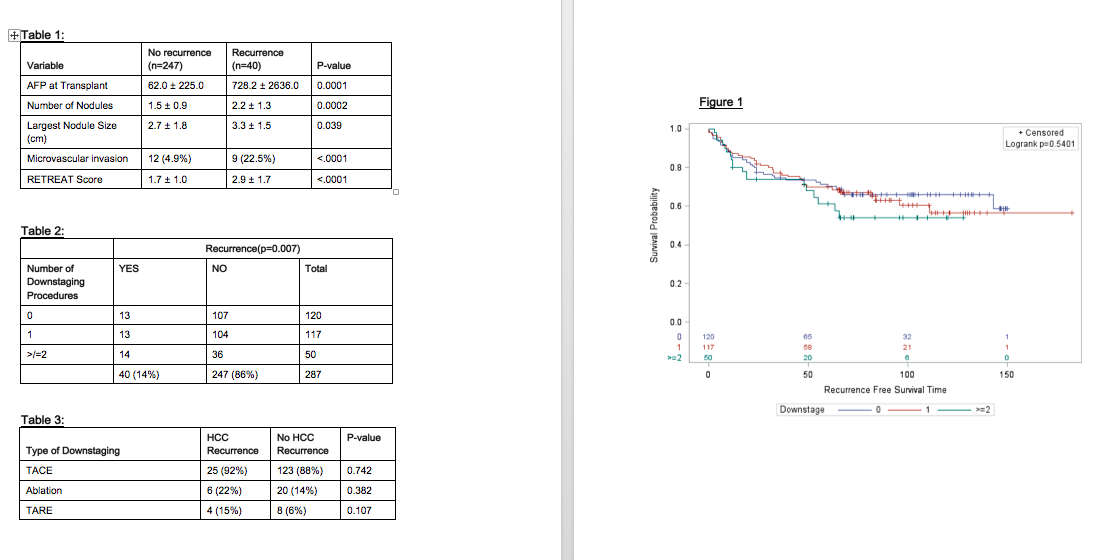Multiple Downstaging Episodes for Hepatocellular Carcinoma Prior to Liver Transplant Increases Risk of Post-Transplant HCC Recurrence
Henry Ford Hospital, Detroit, MI
Meeting: 2020 American Transplant Congress
Abstract number: A-148
Keywords: Hepatocellular carcinoma, Liver transplantation, Recurrence
Session Information
Session Name: Poster Session A: Liver: Hepatocellular Carcinoma and Other Malignancies
Session Type: Poster Session
Date: Saturday, May 30, 2020
Session Time: 3:15pm-4:00pm
 Presentation Time: 3:30pm-4:00pm
Presentation Time: 3:30pm-4:00pm
Location: Virtual
*Purpose: Early-stage Hepatocellular Carcinoma (HCC) is best managed with liver transplantation (LT). Several studies have shown that patients meeting Milan or successfully downstaged to meet criteria for transplantation have comparable survival. Downstaging is frequently performed by thermal ablation, transarterial chemo‐embolization (TACE), stereotactic body radiation therapy (SBRT), and/or transarterial radioembolization (TARE). This study aims to elucidate effects of downstaging (DS) on HCC recurrence rate and recurrence free survival (RFS) and validate previously reported factors that can predict post-LT HCC recurrence.
*Methods: A retrospective review was performed of liver transplant recipients at our quaternary care hospital from 2005 to 2016 with a pre-transplant history of HCC. Variables collected include recipient demographics, biochemical parameters, tumor markers, imaging and explant data. Categorical data was analyzed using Chi-square and Fisher’s exact tests while comparisons involving numerical data were made using two-sample t-tests and Wilcoxon rank sum tests.
*Results: A total of 287 patients were transplanted for HCC during this period, with 40 (13.9%) developing post-LT HCC recurrence at a median of 12.0 months. The demographics of the two groups were similar. Factors associated with increased risk of post-LT HCC recurrence include AFP at transplant, number of tumor nodules, size of the largest tumor, microvascular invasion, and a higher RETREAT score [Table 1]. There were 27 patients (67.5%) who underwent downstaging in the HCC recurrence group and 140 patients (56.7%) downstaged in the non-recurrence group. Recurrence rates in the patients without any DS, only 1 DS and 2 or more DS episodes were 10.8%, 11.1% and 28% (p=0.007) [Table 2]. There was a lack of correlation between the modality used for DS (Ablation/TACE/TARE) and the rates of recurrence [Table 3]. Number of DS episodes was not associated with recurrence-free survival (p=0.54) [Figure 1].
*Conclusions: While this study validates the RETREAT score and its variables, individually, as significant predictors of HCC recurrence, there is concern for an increased risk of post-transplant HCC recurrence as the number of downstaging attempts increases. We need to consider that “downstaging” can result in variable outcomes depending on the process of decreasing tumor burden to make one eligible for transplantation.
To cite this abstract in AMA style:
Mishra K, Siddiqui M, Farris A, Salgia R. Multiple Downstaging Episodes for Hepatocellular Carcinoma Prior to Liver Transplant Increases Risk of Post-Transplant HCC Recurrence [abstract]. Am J Transplant. 2020; 20 (suppl 3). https://atcmeetingabstracts.com/abstract/multiple-downstaging-episodes-for-hepatocellular-carcinoma-prior-to-liver-transplant-increases-risk-of-post-transplant-hcc-recurrence/. Accessed February 21, 2026.« Back to 2020 American Transplant Congress

